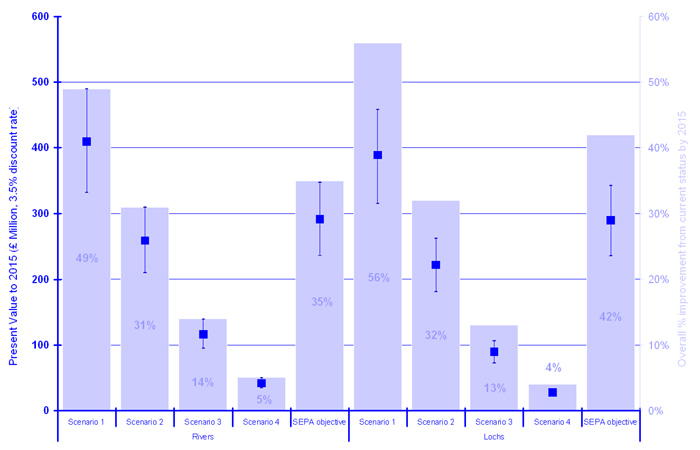The Non-Market Benefits Of Reaching Good Ecological Status For Scotland's Rivers And Lochs
Published on 6 November 2009 in Sustainability and Communities
Introduction
The Water Framework Directive (WFD) consolidates existing water-related legislation with the objective of delivering good ecological status (GES) for Europe’s surface waters. It also requires policy makers and environmental regulators to compare the costs and benefits of compliance.
To date, much of the focus in Scotland has been on the cost of compliance and the objective of complying at minimum cost. But a cost-effectiveness approach does not tell us whether the WFD is actually an efficient policy. Efficiency requires a comparison of costs with benefits. Such a comparison can also tell us when costs of measures are “disproportionately high”. This is the case when costs exceed benefits. In such cases, policy makers may consider to exempt certain areas from WFD driven improvement.
It is undisputed that water is considered a very valuable resource. The main challenge for benefit estimation, however, is that water has many values, few of which are reflected in markets. Benefit estimates must therefore be derived by non-market valuation methods based on public preferences for environmental changes brought about by WFD Programme of Measures to reach GES across the country.
Key Points
The non-market benefits of achieving GES across Scotland are substantial. Based on the total number of rivers and lochs reaching GES, our policy scenario analysis suggests that WFD implementation can deliver non-market benefits in Scotland of over £0.5 billion in the next seven years for compliance with targets set by the environmental regulator (SEPA). See Figure 1 – SEPA improvement scenarios in the River Basin Management Plan are for an increase of 35% in total river length and 42% of total loch surface area reaching GES from current quality conditions by 2015. Figure 1 also introduces the non-market benefits of other alternative policy improvement scenarios for rivers and lochs at national level.

Research Undertaken
We applied choice experiments to elicit preferences for WFD related water quality improvements in Scottish rivers and lochs. The results allow estimation of willingness to pay (WTP) per household of proposed changes arising from alternative WFD objectives implementation scenarios. A total number of 432 face to face interviews with members of the general public were conducted across Scotland. Regional variation was included in the sampling design to allow for a geographical breakdown of the final results. One highlighted feature of the survey design was national maps (Figure 2) and pie charts that were designed to represent the geographical distribution of baseline water quality levels for rivers and lochs.
Results
- Overall, respondents preferred improvements in water quality compared to current levels with a limit to the amount of money they are willing to pay for water quality changes.
- There were differences in preferences for restoring river quality compared to loch quality
- Improvements achieved in the first river basin management plan (by 2015) were preferred over longer term improvements (2028)
- Respondents in north of Scotland have stronger preferences for faster improvements.
.jpg)
.jpg)
Figure 2. Examples of survey instrument material – River and loch national water quality maps
Policy Implications
Benefit estimates of water quality improvements can be used for economic impact assessment of Scottish River Basin Management Plans. Substantial benefits obtained from water quality improvements offer a justification for, but also impose a limit on, achieving WFD objectives at the national scale. In this respect, benefits assessment data could offer preliminary benchmarks for the definition of disproportionate costs and hence be used to economically inform the setting of environmental standards for WFD implementation in Scotland.
For More information:
Lago, M., Glenk, K., and Moran, D. (2009) "Exploring public preferences for water quality improvements: implications for the implementation of the EC Water Framework Directive in Scotland" Paper submitted to water policy.
Author
Manuel Lago and Klaus Glenk, Macaulay Land Use Research Institute m.lago@macaulay.ac.uk k.glenk@macaulay.ac.uk
Topics
Sustainability and Communities







